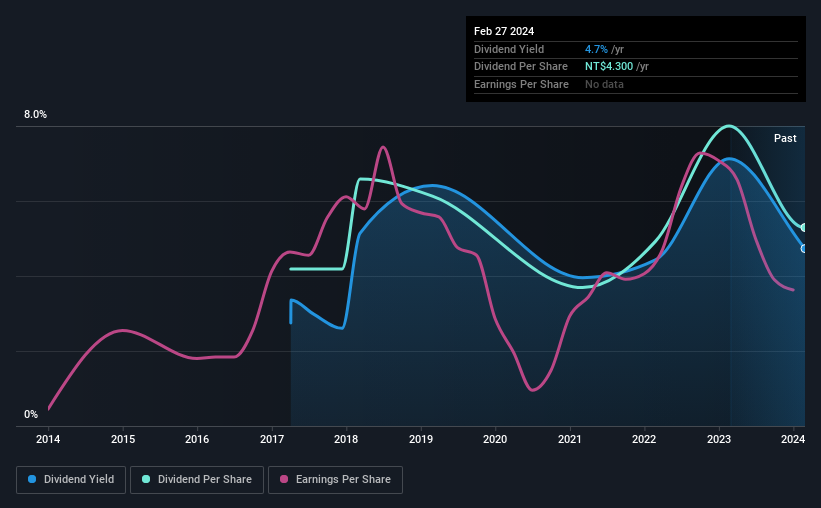Taiwan Steel Union (TWSE:6581) Is Reducing Its Dividend To NT$4.30

Taiwan Steel Union Co., Ltd.'s (TWSE:6581) dividend is being reduced from last year's payment covering the same period to NT$4.30 on the 26th of April. However, the dividend yield of 4.7% still remains in a typical range for the industry.
View our latest analysis for Taiwan Steel Union
Taiwan Steel Union Doesn't Earn Enough To Cover Its Payments
We like a dividend to be consistent over the long term, so checking whether it is sustainable is important. Before making this announcement, Taiwan Steel Union was paying out quite a large proportion of both earnings and cash flow, with the dividend being 103% of cash flows. This is certainly a risk factor, as reduced cash flows could force the company to pay a lower dividend.
If the company can't turn things around, EPS could fall by 8.6% over the next year. If the dividend continues along recent trends, we estimate the payout ratio could reach 112%, which could put the dividend in jeopardy if the company's earnings don't improve.

Taiwan Steel Union's Dividend Has Lacked Consistency
It's comforting to see that Taiwan Steel Union has been paying a dividend for a number of years now, however it has been cut at least once in that time. This makes us cautious about the consistency of the dividend over a full economic cycle. The annual payment during the last 7 years was NT$3.40 in 2017, and the most recent fiscal year payment was NT$4.30. This works out to be a compound annual growth rate (CAGR) of approximately 3.4% a year over that time. We're glad to see the dividend has risen, but with a limited rate of growth and fluctuations in the payments the total shareholder return may be limited.
Dividend Growth May Be Hard To Come By
Growing earnings per share could be a mitigating factor when considering the past fluctuations in the dividend. It's not great to see that Taiwan Steel Union's earnings per share has fallen at approximately 8.6% per year over the past five years. If earnings continue declining, the company may have to make the difficult choice of reducing the dividend or even stopping it completely - the opposite of dividend growth.
The Dividend Could Prove To Be Unreliable
Overall, the dividend looks like it may have been a bit high, which explains why it has now been cut. The payments are bit high to be considered sustainable, and the track record isn't the best. This company is not in the top tier of income providing stocks.
Companies possessing a stable dividend policy will likely enjoy greater investor interest than those suffering from a more inconsistent approach. However, there are other things to consider for investors when analysing stock performance. Just as an example, we've come across 2 warning signs for Taiwan Steel Union you should be aware of, and 1 of them is significant. Is Taiwan Steel Union not quite the opportunity you were looking for? Why not check out our selection of top dividend stocks.
Valuation is complex, but we're here to simplify it.
Discover if Taiwan Steel Union might be undervalued or overvalued with our detailed analysis, featuring fair value estimates, potential risks, dividends, insider trades, and its financial condition.
Access Free AnalysisHave feedback on this article? Concerned about the content? Get in touch with us directly. Alternatively, email editorial-team (at) simplywallst.com.
This article by Simply Wall St is general in nature. We provide commentary based on historical data and analyst forecasts only using an unbiased methodology and our articles are not intended to be financial advice. It does not constitute a recommendation to buy or sell any stock, and does not take account of your objectives, or your financial situation. We aim to bring you long-term focused analysis driven by fundamental data. Note that our analysis may not factor in the latest price-sensitive company announcements or qualitative material. Simply Wall St has no position in any stocks mentioned.
About TWSE:6581
Taiwan Steel Union
Manufactures and trades in zinc oxide and non-metallic mineral products in Taiwan.
Flawless balance sheet with proven track record.


